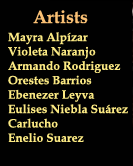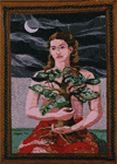



|
Mayra Alpízar: a woman forgets her beauty. by María Esther Ortiz The Lady of the Ceiba (application, embroidery)
The
work of Mayra Alpízar Linares (Lemons, Matanzas, 1956)
it is antithesis: she paints with cloths and threads
and this confuses, believe the dispersion when appreciating
it: there is a mature occupation that prepares the
elements of the artistic act with impeccable technical
knowledge, with essential content budgets. And there
is a technique to carry out it that associates to
the craft. I prefer to say that Mayra paints with
cloths and threads, it is its form of making. The utilitarian concept of the handmade object, so enriched in their speech, moves of a domestic use as tapestry, sobrecama, cloth, cloth door that ennobles the poverty of a home with the sweetness of the seams y stitches of a woman that has chosen cloth pieces, waste of dresses, to make a curtain... It is always a challenge for this artist, she knows that these matters she has gone trying in their work, would be very appreciated in the transitions of the oil, the watercolor, the classic forms of painting. I was during several years without following the work of Mayra. She remembered their tapestries, of the time in that the figures were plane, and I always marveled the wealth of colors, textures and proposals in their works. The reencuentro, was with The lady of the ceiba, this desgarradura lacerante, so expressive in the face of the portrait, in the look that –with cloths and stitches - discovers feelings and complex emotions, the posture of who you hurts in solitude and it sustains with stability the axes of convictions and values, the absences and the hopes. The lady that experiences that have changed their world that has defined the permanency and the nostalgia has lived. It was a touching reencuentro and a demonstration of the expression of original cubanía, raigal. Because nobody can explain to me, but who knows this work, she doesn't doubt that the woman of the portrait is Cuban.
|








